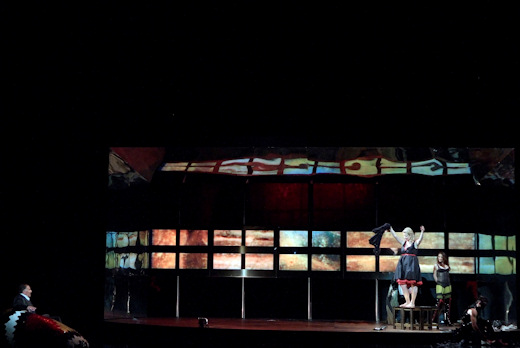Other Links
Editorial Board
- Editor - Bill Kenny
Assistant Webmaster -Stan Metzger - Founder - Len Mullenger
Google Site Search
SEEN AND HEARD
INTERNATIONAL OPERA REVIEW Mediterranean
Festival 2010 - R. Strauss,
Salome: Soloists, Orquestra de la Comunitat Valenciana, Conductor: Zubin Mehta. Palau de les Arts de Valencia. 19.6.2010 (JMI) New Production. Sets and Costumes: Louis Desiré. Lighting: Bruno Poet. Cast: Salome: Camilla Nylund. Jochanaam: Albert Dohmen. Herodes: Siegfried Jerusalem. Herodias: Hanna Schwarz. Narraboth: Nikolai Schukoff. Herodias's Page: Adriana Zabala. Jews: Niklas Björling Rygert, Emilio Sánchez, Eberhard
Francesco Lorenz, Antonio Lozano. Miguel Angel Zapater. Nazarenes: Alexander Vinogradov, Karoly Szemeredy. Soldiers: Vincent Pavesi. Pawel Izdebski. Capadocian: Isaac Galán.
Salome was played by the Finn Camilla Nylund, a lyric soprano, which is an acceptable voice for this teenage character as Richard Strauss himself decided later. However, for a large house Camilla Nylund's voice is not powerful enough. I remember seeing her in this character at the Toulouse Capitole and I wrote that she would surely suffer were she to sing the role in a large theatre. And this is what happened here. She is rather weak for the part in the middle and
low registers, while the top is somewhat tight. She is a very good interpreter on stage
however, and sings with great conviction.
Direction: Francisco Negrin.

Production Picture © Tato Baeza
Attending another Salome barely two months after seeing the wonderful performances of this opera at the Teatro Real was taking a risk, to say the least. My caution was justified
too, since overall this new Salome in Valencia was good, but not exceptional.
This Palau de les Arts' new production was by Francisco Negrín, a regular presence in Valencia.
His interpretation showed a depraved, modern society with its scenery built on a rotating stage, where we saw Herod’s banquet room with many extras and a decadent atmosphere on one side, and Jochanaan's cistern (or, rather, a simple cell with mirrors) on the other. The costumes were modern and drew
particular attention to the figure of the Prophet in his long tunic. The stage direction by Francisco Negrín wasn't especially original, especially when compared with Robert Carsen in Madrid.
In general, there were too many extras on stage. Narraboth’s death was done well, but there was less to grip the attention in the discussion between the Jews, while the dance of the seven veils was only portrayed
by music. During this scene Herod showed images to Salome, in which she was seen as a young girl photographed secretly by her stepfather, and the "dance" ended with Salome forced by Herod in the adjacent room. In the final scene Salome did not sing with the head of the Baptist but with the full body, which lost much of
the scene's impact - and the many requests from Salome for "the head of Jochanaam on a silver tray"
produced nothing of the kind.
Zubin Mehta was on the podium at the Palau and he offered a brilliant, rather than deep, reading of the score. Obviously Mehta is aware of the quality of the Valencia orchestra and this allows him to be truly spectacular at times. Valencia always provides great music, reaching standards far above other houses in Spain
and I do realize that if this version of Salome had been offered anywhere else in Spain, I would have been totally impressed: but human beings easily become used to the exceptional, and
I have begun to consider it normal for Zubin Mehta to bring us a great Salome. If only his brilliance had been accompanied by greater depth, we could
easily have been talking about a reference standard performance.
Albert Dohmen was an excellent Jochanaam, one of the best today in this role. He gave a compelling and powerful interpretation of the Baptist, showing a man who is out of step with the world around him.
The veteran (70) Siegfried Jerusalem has been one of the great Wagnerian tenors of the last 30 years, although now his appearances on stage are very rare and always in minor characters. Jerusalem's voice today has become rather dull in the centre, but it improves at the top, although it is tight and he had a minor vocal accident during the performance.
Another veteran (67), Hanna Schwarz, sang Herodias and she still has a powerful middle range, although the top is quite shivery.
She does remain an important actress however.
The character of Narraboth is often cast for a light tenor. This did not happen in Valencia, where they had the good idea of casting a spinto tenor in the shape of Nikolai Schukoff. The choice was an
undoubted success and proved that Narraboth is not a secondary character when his interpreter has an important voice.
In general, the secondary roles were well covered. Adriana Zabala had a small voice as Herodias' Page
and the Nazarenes were well interpreted by Alexander Vinagradov, a luxury in the role, and Karoly Szemeredy. Among the five Jews the best was Niklas Björling Rygert, while Miguel Ángel Zapater was almost inaudible. The Soldiers were excellent.
There was a full theatre and great enthusiasm was shown at the final bows, including a standing ovation for Zubin Mehta and the Orchestra. There was
also a very warm reception for all the singers.
José M Irurzun
